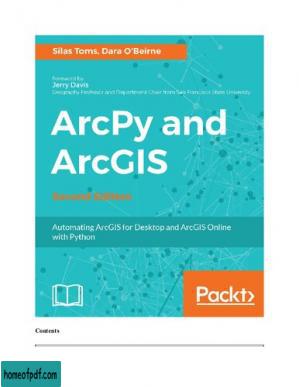ArcPy and ArcGIS: Automating ArcGIS for Desktop and ArcGIS Online with Python
该资源由用户: 雾水浩广 上传 举报不良内容

尊敬的读者:
欢迎您访问我们的网站。本站的初衷是为大家提供一个共享学习资料、交换知识的平台。每位用户都可以将文件上传至网盘并分享。
然而,随着用户上传的资料增多,我们发现部分不宜或版权问题的书籍被分享到了本站。
为此,我们已经关闭了分享入口,并进行了多次书籍审查,但仍有部分内容未能彻底审查到位。
在此,我们恳请广大读者与我们共同监督,如发现任何不宜内容,请 点击此处 进行举报,我们会第一时间处理并下架相关内容。
希望我们能共建一个文明社区!感谢您的理解与支持!
猜你喜欢

《敏感的力量:如何让敏感成为一种优势》黄志坚经典版
View more
《敏感的力量:如何让敏感成为一种优势》黄志坚经典版

《果敢力:始终做自己的艺术》蒋齐仕
View more
《果敢力:始终做自己的艺术》蒋齐仕

《亡者归来》詹森·莫特文字版
View more
《亡者归来》詹森·莫特文字版

《七个被绞死的人》安德列耶夫
View more
《七个被绞死的人》安德列耶夫

WCF Multi-layer Services Development with Entity Framework 4th Edition - Mike Liu
View more
WCF Multi-layer Services Development with Entity Framework 4th Edition - Mike Liu

《积极计算:体验重塑科技未来》拉斐尔·A.卡里罗/张克俊中文版
View more
《积极计算:体验重塑科技未来》拉斐尔·A.卡里罗/张克俊中文版

Pro SQL Server 2012 BI Solutions - Randal Root and Caryn Mason
View more
Pro SQL Server 2012 BI Solutions - Randal Root and Caryn Mason

《指数基金投资指南(雪球【岛】系列) (雪球「岛」系列)》银行螺丝钉文字版
View more
《指数基金投资指南(雪球【岛】系列) (雪球「岛」系列)》银行螺丝钉文字版

Creating Augmented and Virtual Realities - Erin Pangilinan, Steve Lukas, and Vasanth Mohan
View more
Creating Augmented and Virtual Realities - Erin Pangilinan, Steve Lukas, and Vasanth Mohan

《金银岛》[英] 罗伯特・路易斯・史蒂文森杨浩田译中文版
View more
《金银岛》[英] 罗伯特・路易斯・史蒂文森杨浩田译中文版

《每天演好一个情绪稳定的成年人》老杨的猫头鹰
View more
《每天演好一个情绪稳定的成年人》老杨的猫头鹰

Computer Science Programming Basics with Ruby - Ophir Frieder, Gideon Frieder, and David Grossman
View more
Computer Science Programming Basics with Ruby - Ophir Frieder, Gideon Frieder, and David Grossman


